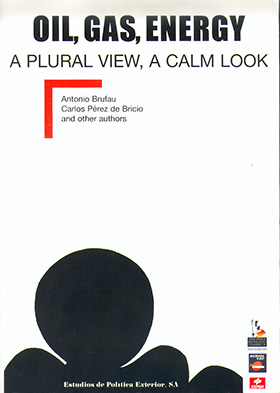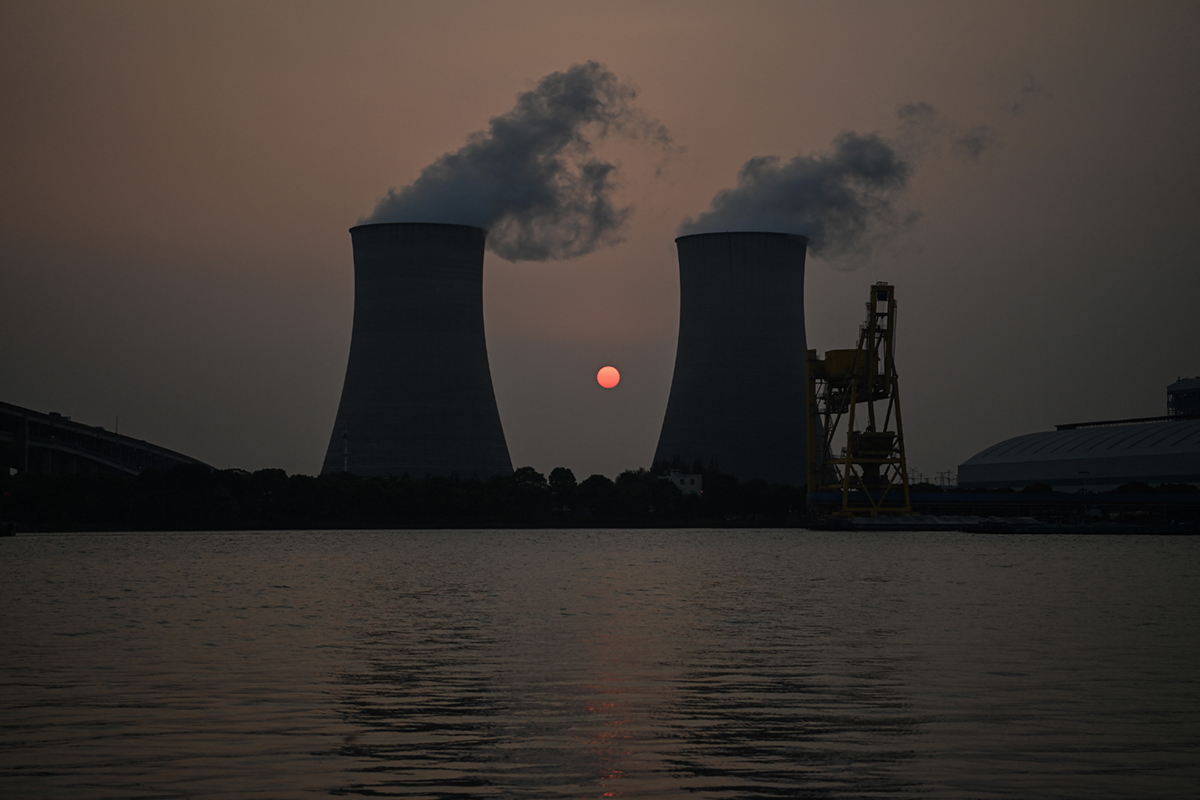Subtotal: 14.00€

Oil, Gas, Energy. A Plural View, a Calm Look
Con ocasión del Congreso Mundial del Petróleo, celebrado en Madrid en junio de 2008, Estudios de Política Exterior publicó, con el apoyo de Repsol YPF y Cepsa, Oil, Gas, Energy. A Plural View, a Calm Look, un estudio en inglés sobre el futuro de la energía a cargo de reconocidos expertos.
Oil and Gas. A Plural View, a Calm Look, by Jorge Segrelles
The present study is published to coincide with the celebration this year in Madrid of the 19th World Petroleum Congress. This work is sponsored by the Organising Committee of the World Petroleum Congress (Comupet), and the companies Cepsa and Repsol YPF, and is essentially dedicated to oil and gas, without forgetting other sources of energy that will play a decisive role in the future in satisfying the world’s energy demands in a sustainable manner.
There are currently many challenges facing both the oil and gas sector, in order to supply the energy demanded in a secure, sustainable and affordable way. These challenges extend to society in general, which must create an adequate framework to foster the development of new technologies that improve energy efficiency, allow for the use of fossil fuels in a more environmentally-friendly manner, and which efficiently add renewable energies to the mix, without undesired effects on the environment or the production of foodstuffs.
The increase in the price of energy over the last few years, together with estimates of the growth in demand, particularly in Asia, and a possible peak in the production of crude oil during the next decade, have meant that concepts such as energy geopolitics, energy nationalism, security of supply or energy dependency are present in all discussion fora. These concepts are not new to the oil industry, which has had to manage geopolitical risks as far back as the beginning of the 20th century.
The duality of producer and consumer countries has become ever more patent. High and growing energy dependence on oil and gas, both in developed countries (OECD) and in the Asian countries with the highest growth rates (China and India), has increased concern regarding security in the supply of energy. The new alliances in energy supply (Russia-China-Iran), or the possible creation of a cartel of gas producers, threaten the security of the supply of energy to Europe, which has in turn recognised the need for a common foreign energy policy, and is reaching agreements that guarantee the supply of the energy it requires.
Let us attempt to forecast the evolution of the oil and gas industry over the next twenty years. According to the International Energy Agency (IEA), estimated demand for the year 2030 suggests that oil and gas will represent between 53 and 55 per cent of the world’s primary energy consumption (a percentage that is very similar to the current figure), according to the scenario considered, with an annual increase in consumption of 1 per cent for crude and 2 per cent for gas during the period 2005-2030. According to these same estimates, the demand for crude might be satisfied in 2030 via increasing OPEC production, which holds the majority of the world’s reserves, as well as through the exploitation of non-conventional oil, such as oil sands or extra heavy crude. In the case of gas, most of the increase in production will stem from the Middle East, Africa and Latin America. Technological innovations in the exploration and production of crude and gas in remote areas will be a major challenge in the bid to add new reserves to existing verified ones. The production of synthetic liquid fuels from natural gas (GTL), biomass (BTL) or coal (CTL) will also contribute to supplying part of the energy needed, essentially for transport.
The transport sector will represent approximately 50 per cent of the demand of oil, driven by growth in the number of vehicles, which will have doubled by the year 2030 to exceed 2,000 million, with spectacular growth in the developing economies of Asia. By 2025 there will be as many vehicles in the OECD as in the remaining countries, and by 2030 non-OECD countries will exceed the number of vehicles in the OECD by 30 per cent.
During the last decade, the use of low-sulphur unleaded fuels, as well as oxygenated compounds, have become the dominant trend in the specification of automobile fuels in developed countries. The European Union continues to work towards production of clean fuel, trying to improve the quality of the air in terms of emissions of nitrogen oxide and particles. Asian countries, although with a certain delay, also continuously modify these specifications in order to better protect the environment.
On the basis of the shared objective of sustainable development, the major problems within the society are strategic research, of widespread interest, which is the current situation and future trend in the specific automobile fuel in Asia.
Fuels derived from oil will represent by 2030 more than 90 per cent of the total consumed by transport. By that time the development of second generation biofuels will make it possible for close to 10 per cent of fuels to be derived from biomass. The most efficient vehicles will have capped growth in the demand for fuels. However, if this does not occur, demand will be hard to satisfy.
Awareness of environmental problems and, in particular climate change, means that it is crucial to promote the development of technologies that will allow for the use of the more abundant fossil fuels in a way that is more environmentally-friendly (clean coal), as well as add to the energy mix competitive renewable energies, or develop a new generation of more efficient and safer nuclear power plants. The most optimistic estimates of the International Energy Agency (IEA) talk of CO2 emissions by the year 2030 that exceed by 11,000 million tonnes the estimated emissions required in order to stabilise CO2 concentration at 450 ppm. Thus it will be necessary to develop and implement techniques to collect and store CO2. A greater share for nuclear and renewable energies in the supply of primary energy will also help to reduce greenhouse gas emissions.
Accumulated investments in the oil and gas industry, as estimated by the IEA for the period 2006-2030, will amount to between 8.7 and 9.5 billion dollars, implying an average of between 350,000 and 380,000 million dollars a year, of which 55 per cent corresponds to oil and the rest to gas. This volume of annual investment, substantially higher than last decade’s figures, will require an important economic, technological and human effort.
It is possible that some of these estimates might be altered by the high prices of energy, or by a deceleration in the growth of Asian economies that moderates the increase in demand, but the oil and gas sector must be prepared and have at its disposal the necessary technologies and human capital to face the future.
Most of these issues, some of which are covered in this monograph, will also be the object of debate during the upcoming month of June at the World Petroleum Congress in Madrid, with the theme “A world in transition: delivering energy for sustainable growth”, which expects to attract a total of 17,000 participants, including delegates and visitors.
Organisers of the Congress have planned Plenary Sessions, Ministerial Sessions, Poster Plazas and Special Sessions dedicated to key issues within the sector (Water, Social Responsibility, Women within Industry, Youths….), besides the technical sessions, with more than 1,900 papers having been prepared, which are structured into four blocks (Upstream, Downstream and Petrochemicals, Natural Gas and Renewables, and Managing the Industry).
Coinciding with the Congress, the Ifema pavilions will host the World Petroleum Exhibition, which will be a practical platform for the sector and its advances, and the Global Centre for Business Opportunities, where the National Committees of the member countries of the World Petroleum Council will be able to exhibit their national energy industries.
We thank Estudios de Política Exterior (Foreign Policy Studies) for giving us the opportunity to outline the present and future problems facing the oil and gas sector, which in the short and long term will continue to supply society with the energy that is essential for its development and well-being, fulfilling this objective in a sustainable manner that is environmentally-friendly and which complies with the criteria of social responsibility.
ÍNDICE
What is the Future of Hydrocarbons?
Antonio Brufau, “The Future of the Oil Market: The Great Investment Challenge”
Carlos Pérez de Bricio, “The Internationalization of the Oil Company: Cepsa’s Experience”
José Sierra, “A Realistic Diversification of Energy Sources and Technologies”
Juan Bachiller, “A Promising Future for the Oil Industry”
Pablo Benavides,“Is Oil Running Out? ”
Pedro Miras, “Strategic Reserves of Oil Products”
Salvador Gabarró, “Natural Gas: Vector of Growth and Sustainability”
Global or National Security?
Paul Isbell, “The Riddle of Energy Security”
Jean Grenier, “Transport Safety Management: A Challenge for Total Group”
Antonio Llardén, “Natural Gas: From the Gas Field to the Consumer”
José Luis López de Silanes, “The Future of Liquid Hydrocarbon Logistics”
Manuel de la Rocha, “EITI: Overcoming the ‘Resource Curse’ in Developing Countries”
Conflicting Geopolitics?
Federico Steinberg, “The New Geopolitics of Hydorcarbons”
Carlos Herrera, “The South American Energy Scenario: Brazil and Peru”
Luis Esteban G. Manrique,“Pemex, PDVSA and the Paradox of Abundance”
Richard Youngs, “Oil Companies and the EU’s External Energy Policies”
Luis Alcaide, “Notes on Africa, Oil and Other Energy Sources”
Manuel Valencia,“The Russian Oil Industry”
Alejandro V. Lorca, “Domestic and Foreign Challenges faced by Saudi Arabia”
Carlos Echeverría, “The Emerging Asian Countries and Energy”
Charles Esser, “The Global Natural Gas Sector: From Norway to Qatar”
Renewable Energies, Nuclear Energy?
Rafael Bachiller, “The Sun, Source of all our Energies”
Ernesto Macías, “The Global Energy Problem: The Challenge of Renewable Energies”
Juan Carlos Abanades, “Clean Coal with CO2 Capture and Storage”
Vicente López-Ibor Mayor, “The Nuclear Debate at the Energy Crossroads”
Javier Arana, “Perspectives on the Future of Nuclear Fission Energy”
Víctor Pérez-Díaz, Juan Carlos Rodríguez, “Nuclear Energy and Public Opinion in Spain”
Nigel Lawson, “An Appeal to Reason”



 Oil, Gas, Energy. A Plural View, a Calm Look
Oil, Gas, Energy. A Plural View, a Calm Look 


